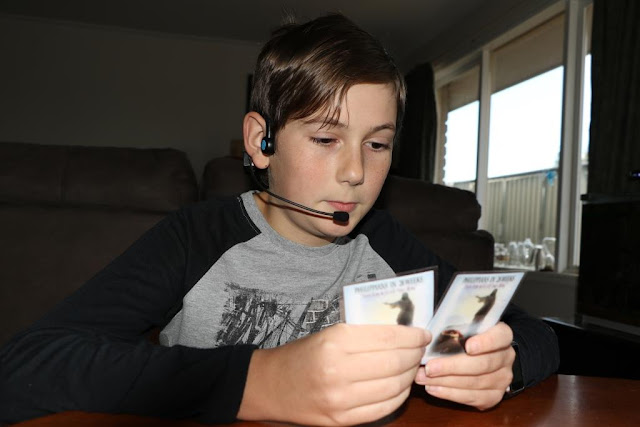Last week Friday we joined another homeschooling family for a day trip into Melbourne city to go to the
200 Years of Australian Fashion exhibition, which is currently on display at
The Ian Potter Centre. There are 101 outfits by ninety designers and makers on display in four galleries.
When you arrive you feel as though you are transported back in time as you enter the display via this passage way.
Oldest Dress c.1805
This
evening dress is believed to be the oldest surviving dress made in Australia and is estimated to have been worn in c.1805. The fabric is muslin which is thought to have originated in India. The silver in this dress used to be golden but has faded over the years. The dress is entirely hand made .
Maternity Dress c.1828
This gown was hand-sewn out of silk serge (this is a woven fabric with diagonal ridge patterns of brown and cream thread)and only worn in private within the home. It has a front-opening bodice, drop front cut into the skirt to show the shift as the waistline lowers and skirt widens.
Cotton and Silk evening Gown c.1855
This beautiful gown was worn by Anne Lavinia Grice who was the wife of a prominenet pastroalist and bussinessman. She arrived in Australia in 1843 and married in Sydney before moving to Melbourne in the 1850's. The dress is made of cotton, silk, metal, mother-of-pearl and baleen.
The Department Store
During the 1850's in Australia small general stores (repositories) sold a range of drapery and trimming supplies to the working class. The upper class acquired their clothing at men's tailors and outfitters and woman"s dressmaking establishments. By the mid to late nineteenth century impressive emporiums had appeared on the scene and changed the streetscape and increased the local availability of fashionable clothing.
 |
| Silk and Cotton Dress c.1877 |
Silk Bonnet c.1875
This bonnet is from Mrs O'mera Millinery Establishment in
Inverell, New South Wales
Dressmaking and Tailoring
- Dressmaking is based on draping fabric around a form and was traditionally practiced by women around the world.
- Tailoring was historically practiced by men and is the art of measurements, pattern cutting and shaping.
- The nineteenth century saw the beginning of the practice of applying labels to clothing and therefore the recognition of designers and allow us to now track an individual's signature style.
- It was during this time that tailors began to make men as well as women's equestrian wear.
- In 1861 a census revealed that 20% of woman worked outside the domestic environment.
- Black was worn as a symbol of sadness at the death of a loved one.
Wedding Outfit 1889
This outfit is made of wool, silk, metal, cotton, wax and plastic. It was purchased and worn by Mrs Ethel Florence Francis for her wedding to Cr David Phillips. They were married at the Sydney Rd Methodist Church in Brunswick Melbourne on 30 January 1889.
Cape 1895
This cape is made from silk, metal, wool, glass and mirror by George & George. It is one of the earliest labeled items of clothing by the George brothers William and Harley. They moved to Melbourne from England in 1877 and established George and George in 1880.
Early 20th Century
Evening Dress c.1959
This dress was from the fashion house
La Petite (1940-86) in Melbourne. It was purchased and worn by Annette Klooger. She wore it in a live performance on The Graham Kennedy Show.
Ball Gown 1956
This ball gown is from the fashion house
La Petite (1940-86) in Melbourne. It was worn by Lady Brooks, the wife of the Governor of Victoria, Sir Dallas Brooks, to a reception they held for the Duke of Edinburgh in 1956 who was visiting Melbourne for the Olympics. It was made of silk, cotton, glass beads, sequins, diamante and artificial flowers.
1960's Youth Culture
Fashion took on a radical social change during this era. Ready to wear clothing replaced custom-made clothing. A whole new generation of designers pioneered fashion and the clothing industry in Australia.
1970's Flamingo Park Sydney
Jenny Kee opened Flamingo Park along with her friend and fellow designer Linda Jackson which produced clothing with a decidedly Australian flair.
1980's
These years are when Australia became increasingly independent in their fashion culture and were years when the designers experimented with unconventional materials and began to blur the lines between fashion and art.
Next week I will continue the journey fashion in Australia. The children and I were pleasantly surprised at how much we really enjoyed this exhibition. I highly recommend it for the young and old alike.
This display is open to the public until the end of July.
Blessings
Chareen









































